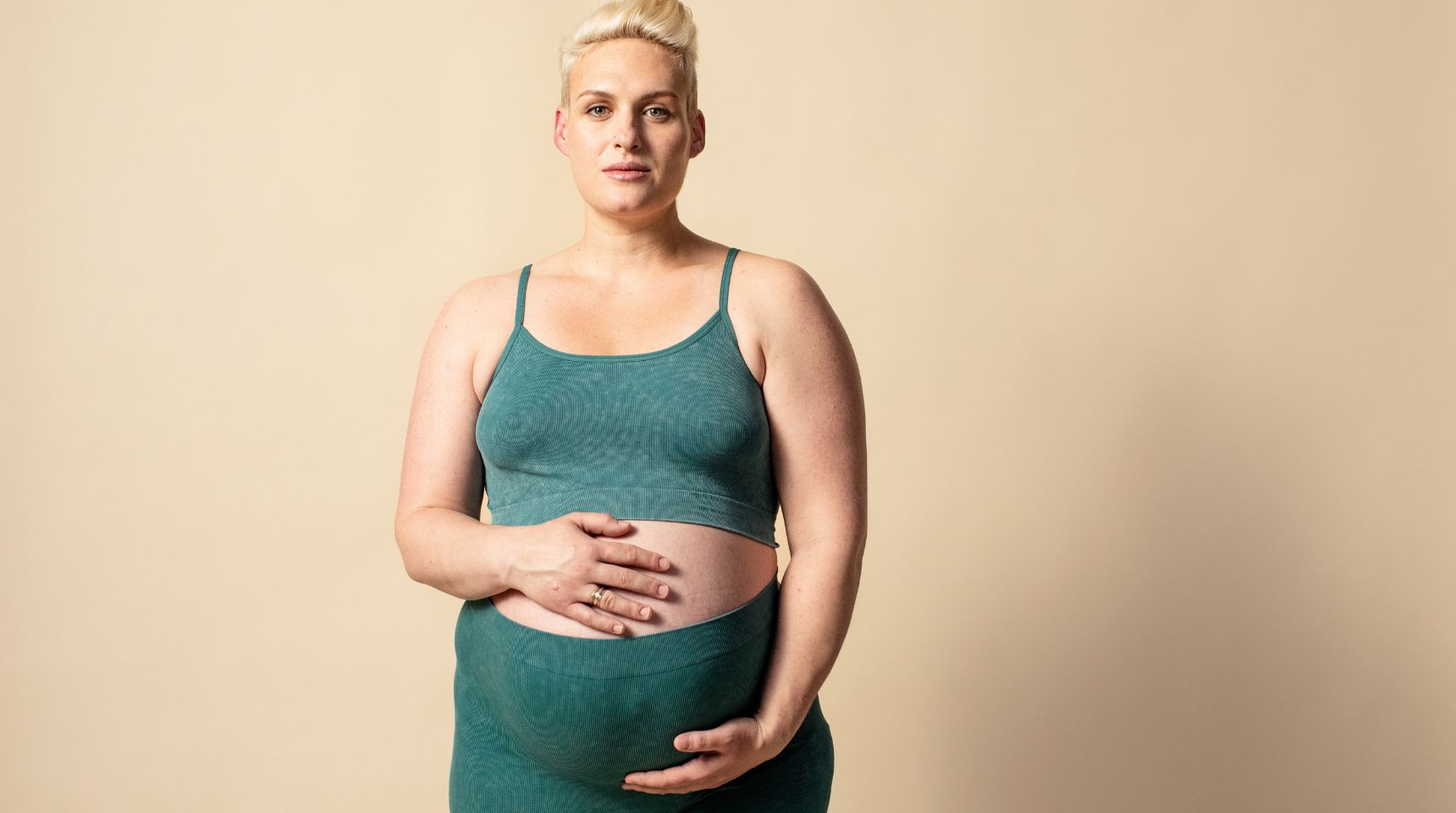What every mom needs to know about the 4th Trimester
As all expectant mothers know, pregnancy consists of three 'trimesters' or terms, each lasting roughly three months. 'The fourth trimester' describes the time from birth until your baby is around three months old. It was first described by British childbirth expert and activist Sheila Kitzinger in the mid-1970s:
“There is a fourth trimester to pregnancy, and we neglect it at our peril. It is a transitional period of approximately three months after birth, particularly marked after first babies, when many women are emotionally highly vulnerable, when they experience confusion and recurrent despair, and during which anxiety is normal and states of reactive depression commonplace.”[1]
More recently the term has been popularised by American paediatrician and author Dr Harvey Karp, who points out that the fourth trimester is challenging for babies as well as moms:
“If given the choice, babies would definitely have voted for a few extra months inside the womb. So, for the first three months post-birth – the fourth trimester – you should think of babies as foetuses outside the womb…
“During the fourth trimester, you can expect fussiness and crying from your baby and very likely exhaustion for you. Newborn babies are learning to adjust to life outside the womb where it was warm and squishy! They will push their new vocal cords to the limits with screams, naps might feel few and far between and only happen on you, and you will find yourself on an erratic sleep schedule… The fourth trimester is nothing short of stressful, frustrating, and exhausting.”
Although sometimes gruelling, these early weeks of parenting are also full of love and cuddles as you get to know your newborn, introduce him to friends and relations, and settle into family life. You'll experience the immense rewards of seeing your baby's rapid development and starting to understand his personality too. Being prepared for the fourth trimester, mentally and practically, will help you and your partner get through the challenges, adjust to your new role as parents, and enjoy this special time.
[1] www.nichq.org/insight/moms-deserve-better-care-fourth-trimester
Your newborn's sensory and social development
Your baby is born completely helpless. Unlike other single-born mammals, who can stand or cling to their mother within their first hour of life, your newborn can't even support his own head. He's completely reliant on you to meet all his needs.
Your newborn's brain grown by an incredible 1% each day during his first three months of life.[1] By the end of the fourth trimester, he won't just be lifting his head. He'll also be smiling and cooing – the beginnings of communication. He'll be able to grasp things and kick his legs – the beginnings of motor skills. And he'll be able to follow things with his eyes and reach for them – the beginnings of hand-eye coordination.
Your baby's vision will improve dramatically during those early weeks. Scientists disagree about how well newborns can see (the range of colours and focus, for example), but two things are certain: tiny babies love looking at faces more than anything else, and they focus best on objects that are 20 to 35cm away – that's about the distance of your face when your baby is feeding.[2] [3]
By the time he's a month old, you might notice your baby likes to look at strong black and white patterns and sharply contrasting colours. And by two to three months you'll see him tracking objects with his eyes and starting to recognise favourite people and things from a greater distance.
Your newborn recognises and prefers your voice to any other, having heard it so often in the womb.[4] If you find yourself talking to your baby in a higher-pitched, slower, sing-song voice, it's because you instinctively know that newborns prefer this 'parentese' or 'infant-directed speech'.[5]
You and your partner can support your baby's sensory and social development during these first three months by interacting with him whenever possible. Talk to him, sing to him, ask him questions and invent his answers, make eye contact and exaggerate your facial expressions. Give a running commentary as you dress, change or bathe him. Choose high-contrast toys, books and mobiles to capture his attention. And don't get distracted by your phone, computer or TV screen when your baby wants to engage with you.
[1] www.sciencedaily.com/releases/2014/08/140811165817.htm
[2] www.ncbi.nlm.nih.gov/pmc/articles/PMC4243010/
[3] www.mayoclinic.org/healthy-lifestyle/infant-and-toddler-health/in-depth/infant-development/art-20048012
[4] www.parentingscience.com/newborns-and-the-social-world.html
[5] www.sciencedaily.com/releases/2020/02/200203151158.htm
Soothing and settling your baby
Expectant parents often create a beautiful nursery or buy an expensive crib, only to find that their newborn won't sleep in it. “He hates being put down,” and “he'll only sleep on me” are two of the most common complaints of new parenthood.
Look at the situation from your baby's perspective. He's spent nine months in the dark comfort of your womb, where the temperature was consistently warm, he was surrounded by amniotic fluid, and his belly never felt empty thanks to the hard work of your placenta and umbilical cord. He was rocked and swayed as you went about your daily life, and your digestive system and blood flow provided a constant muffled soundtrack.
Many experts, including Dr Harvey Karp, suggest the best way to help a baby adapt to the outside world is to make conditions as womb-like as possible. You'll probably instinctively shush and rock your baby to settle him, and you might use swinging chairs, rocking cribs and white noise machines or apps to create the same effects when you're busy.
Wearing your baby in a sling when you go out or do household tasks reconnects him to the familiar movements of your body that he felt in the womb. A sling also keeps him warm and secure, close to the comforting smell of your body and sound of your voice. Always position him with his face in view, his back supported and his chin away from his chest – follow the TICKS guidance for safe baby-wearing.
Some babies (though not all) like to be swaddled in their first few weeks as it helps to recreate the feeling of confinement they felt while in your belly. If you try it, make sure you follow safe swaddling guidance. And some babies (not all) love being in a warm bath, especially if you're in the tub with them. Again, follow advice to bathe your baby safely.
Babies in the womb have been seen sucking their thumb in scans from as early as week ten of pregnancy, but once born they can struggle to connect hand to mouth. If you notice your newborn trying and failing to suck his thumb, or you discover that sucking on your clean finger helps soothe him, you might want to introduce a dummy (pacifier). For breastfeeding babies it's best to wait until feeding is securely established (usually four weeks or so), and follow guidance to keep dummy-use hygienic and ensure it doesn't interfere with your baby's developing teeth or speech.
If, after all your efforts, your baby still won't settle when he's not being held, remember his behaviour is an ancient self-preservation strategy that keeps him warm, close to his food source and safe from predators. Get through this short but demanding phase by sharing the care with your partner and anyone else who's on hand to provide cuddles. If everyone in the household is suffering from sleep-deprivation, consider following safe co-sleeping guidance – it's far safer than falling asleep with your baby on the sofa.
Crying and colic
Your baby will cry more during the fourth trimester than at any other time in his life. Crying typically peaks at around six weeks and drops significantly when your baby is three to four months old.[1]
Colic is defined as a healthy baby crying for no apparent reason for more than three hours a day, more than three days in a week, for three weeks or more.[2] Although it can happen at any time of day, colicky crying is more common in the evenings, and you may notice your baby also seems gassy and uncomfortable. Colic affects up to a quarter of all babies[3] and there's no proven cure, although the soothing techniques mentioned above may help. Colic is distressing for babies and parents, but the good news is that it usually disappears soon after the fourth trimester.
[1] www.mja.com.au/journal/2004/181/9/1-problem-crying-infancy
[2] www.nhs.uk/conditions/colic/
[3] www.ncbi.nlm.nih.gov/pubmed/28385295
Breastfeeding and skin to skin
Breastfeeding gives your baby the best possible start in life because your milk is full of antibodies and protective factors, as well as nutrients precisely tailored to his developmental needs. No formula milk comes close to providing the health benefits of your own breast milk.
Around eight in every ten mothers in developed countries begins breastfeeding, but many find it more difficult than they anticipated. One study found that 92% of first-time moms have at least one breastfeeding concern by day three.[1]
Feeding guides often repeat the mantra that 'breastfeeding shouldn't hurt' but the reality is that many women get sore nipples in the first few days. Also, around days two to five, your milk will 'come in' and your breasts may become swollen, tender and leaky as your body switches from producing tiny amounts of yellowish colostrum to much larger volumes of creamy breastmilk.
Newborn babies have tiny stomachs so they need feeding frequently – up to 12 or 13 times every 24 hours. While some babies are speedy feeders, draining the breast in as little as 12 minutes, others are slow and sleepy, taking up to an hour.[2] Feed your baby whenever he's hungry, not according to any schedule or timed interval. Sometimes a breastfeed will satisfy him for four hours, sometimes he'll want more milk ten minutes later.
Don't worry – everything you're going through is completely normal. If breastfeeding doesn't come easily, spend as much time as possible skin to skin, with your baby wearing only a nappy while lying tummy-down on your bare chest (with a light blanket or dressing gown over you both if it's chilly). Being skin to skin stimulates your baby's urge to feed and lets him latch on easily whenever he wants to, as well as releasing the hormones prolactin and oxytocin in your body to boost breastmilk production.[3]
Lying skin to skin also helps your baby adjust to life outside the womb by making him (and you) feel secure, calm and relaxed. It releases oxytocin (a.k.a. 'the love hormone') in both of you, which helps with the bonding process. So line up some good box sets, long novels and sofa snacks so you can spend plenty of time in this position during your baby's first few weeks.
Like all new skills, breastfeeding can take a while to master. Over time your body will become more efficient at making and storing milk and your baby will develop a stronger suck and larger stomach – so your breastfeeding sessions will become shorter, the gaps between them bigger,[4] and your breasts less leaky. By the end of the fourth trimester you'll both be well on your way to being breastfeeding experts.
[1] www.ncbi.nlm.nih.gov/pmc/articles/PMC3784292/
[2] http://www.infantjournal.co.uk/pdf/inf_063_cta.pdf
How your partner can support you
Partners can enjoy the benefits of skin to skin with a new baby too, and they can be a huge support with breastfeeding. Studies show that when fathers or same-sex partners are given breastfeeding information and advice, mothers are more likely to start breastfeeding, breastfeed exclusively, and continue breastfeeding for longer.[1]
Although they may not be able to breastfeed themselves, your partner can help with winding and soothing the baby, nappy-changing and bathing, as well as preparing meals, doing housework and dealing with visitors, so that you can rest as much as possible and recuperate from the birth.
If you don't have a partner, or they can't be around much, seek support from other family members or friends. Or consider paid help from a doula or maternity nurse if your finances allow it.
[1] https://www.sciencedirect.com/science/article/abs/pii/S0266613819300841?dgcid=rss_sd_all
Be kind to yourself
Make life as easy as possible for yourself in these first few days and weeks of parenthood. Many moms recommend filling your freezer with hassle-free meals before your due date – ideally ones you can eat one-handing while you feed, burp or rock your baby! Stock up on nutritious snacks too so that you can give yourself a quick energy boost when you're feeding your baby in the wee small hours. Bananas, granola bars, nuts, crackers, hummus, cheese, dried fruit and oat cakes are all good options.
Caring for a new baby takes an incredible amount of time and energy, so take a relaxed attitude to anything else in your life that isn't essential. It really doesn't matter if the vacuuming gets left or your make-up isn't done
Mood swings
Huge hormonal swings following the birth can cause the 'baby blues' – these hit eight out of every ten new moms, usually around day four to five.[1] If you suddenly find yourself feeling tearful, anxious or tetchy during the first week, it's probably a case of the baby blues.
If these symptoms start later or last longer than a couple of weeks, they may be a sign of postnatal depression (PND), which affects around one in every ten new moms. Speak to a healthcare professional if you suspect you might have PND – there's lots of support and a variety of treatments available.
[1] https://americanpregnancy.org/first-year-of-life/baby-blues/
Mental health – ways to feel OK
As a new mom you spend so much time focused on your baby's wellbeing, it's important to make time for your own needs too. Think about what's most essential to your physical and mental health – perhaps catching up with friends, a country walk, a pizza and movie night, an exercise class, or a long bath – and try to find time for at least one of these each week.
Surround yourself with a support network that makes you feel positive about your parenting and helps with any problems. As well as your partner, it might include other family members and friends, trusted healthcare professionals, local baby groups, online forums or parenting books.
Valuable visitors
Chances are you'll have a queue of family and friends keen to meet your new arrival. Try to keep visits on your terms, not theirs. If you'd rather spend a while getting to know your newborn before you welcome guests, that's fine. And if you'd prefer to introduce your baby to people via a video-call than in person at first, that's fine too.
If you do invite visitors, prioritise those who offer practical help. You'll appreciate a guest who brings a meal, offers to do housework or cuddles your baby while your shower far more than one who brings a cute outfit or cuddly toy and eats all your cake!
Your post-baby body
Immediately after the birth you'll still look around 20 weeks pregnant and will still need to wear maternity clothes, but your firm bump will be replaced by a squishier, wrinklier belly. It takes six to eight weeks for your uterus to shrink from the watermelon sized it reached when filled with a full-term baby and placenta to its usual size of a small upturned pear.[1]
Breastfeeding helps your womb return to its pre-birth size as the oxytocin released during feeds makes the uterine tissue contract and also helps reduce blood loss. You may feel 'after-pains', contraction-like sensations, during the first few weeks, particularly during breastfeeds. They're likely to be stronger if this isn't your first baby.
Pregnancy, labour and birth place huge demands on a mother's body, so you may still be feeling some after-effects during the fourth trimester. Over-the-counter painkillers and soothing sitz baths will help with any genital soreness, bruising or haemorrhoids, and gentle exercise such as walking or yoga stretches will ease aches and pains as your organs, bones and muscles return to their pre-pregnancy position. If you have any concerns about your recovery, or notice any signs of infection or haemorrhage (excessive blood loss), contact a healthcare professional straight away.
Don't expect to quickly 'bounce back', no matter what you might have seen in celebrity magazines. It takes many months for your body to grow and birth a baby, and may take many months to recover afterwards. Give yourself time to heal as you get to know your newborn and redefine your relationship with your partner. Giving birth may have instantly made you a parent, but it’s the fourth trimester that shapes your identity as a mother.
[1] www.naturalcycles.com/cyclematters/what-is-a-uterus









